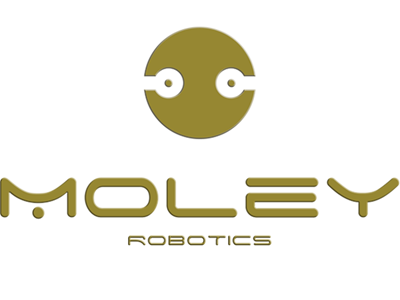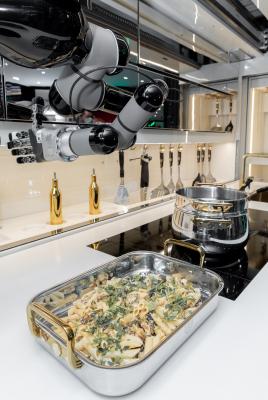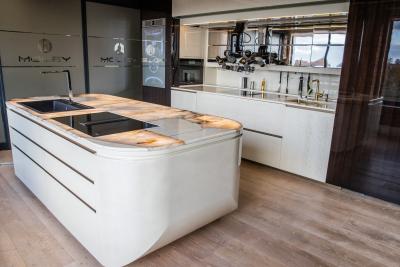



LONDON, Jan. 12, 2021 /PRNewswire/ -- The world's first robotic kitchen was showcased today at CES 2021 (Consumer Electronics Show), one of the world's premier consumer technology shows. Created by British technology company, Moley Robotics, the system features a dexterous robot integrated into a luxury kitchen, that prepares freshly-cooked meals at the touch of a button.
The Moley kitchen is the product of six years research and development by an international team of 100 engineers, product and luxury interior designers and three award-winning chefs.
At the heart of the new technology are two robotic arms featuring fully-articulated 'hands', developed in collaboration with world-leading German robotic company SCHUNK, Moley's exclusive hand partner. The product of 11 exhaustive development cycles they reliably reproduce the movements of human hands. This means the robot kitchen can retrieve ingredients from the smart fridge, adjust hob temperature, use the sink to fill pans and pour, mix and plate up just as a human cook would. The robot even cleans up after itself - without complaint!
The Moley Robotics system does not cook like a machine – it captures human skills in motion. Tim Anderson, culinary innovator and winner of the prestigious BBC Master Chef competition (2011) played an integral role in the kitchen's development, with his cooking techniques 3-D recorded then translated into elegant digital movement using bespoke algorithms.
Tim and fellow chefs Nicole Pisani and Andrew Clarke have created 30 dishes to showcase the systems' capabilities at launch, with new recipes added every month. Ultimately, Moley customers will be able to select from a digital menu with over 5000 choices, as well having the option to record their own family-favorite dishes using Moley's innovative recipe-creator software tool.
The Moley Robotic Kitchen in operation
The Moley Kitchen can be used by both humans and the robot. Bespoke stainless-steel cookware and utensils have been design to be comfortable to hold as well as providing a precision fit in robotic hands.
The Moley Kitchen uses a combination of sensors and optical cameras to map ingredients, cookware and utensils within in the kitchen. Subtle markers on handles and pan lids help the robot orientate the stainless-steel pots, pans, and utensils. The robot's optical system can even spot dropped food and clean up before and after cooking. An integrated UV lamp ensures the cooking area is kept germ free.
Kitchen options
The bespoke kitchen is available in an array of styles. Customers can specify from a wide range of premium marbles, onyx and Corian worktops and select kitchen cabinets in finishes to match the rest of their home decor and styling tastes.
Each kitchen is also available in two formats: as a smart Internet of Things (IoT) enabled kitchen (known as "R"), with or without the integrated robot. The smart kitchen includes an IoT refrigerator and storage which flag when ingredients are about to expire, or are running low, professional-grade induction hob, oven and sink. The smart kitchen can easily be upgraded at a later date to include the fully-automated package (known as "X") with the state-or-the-art robot arms and dexterous hands mounted on the integrated three axis rail system.
The Business
Moley Robotics was founded in 2014 by London-based computer scientist, robotics and healthcare innovator Mark Oleynik. The company is headquartered in the UK and has a showroom in Hammersmith, London.
1205 qualified sales enquiries have been received ahead of launch, off the back of customer clinics. As every installation is bespoke, the price of the Moley Robotic kitchen is dependent on specification, but is comparable to that of conventional luxury kitchens. As the technology matures Moley aims to produce versions at a variety of price points enabling mass-market adoption in much the same way Tesla has with EV cars.
When the first prototype robotic kitchen was revealed 2015, it generated a huge amount interest in the hotel, restaurant and catering industries. A commercial version of the Moley kitchen will be released in 2021 to meet this demand, Moley's engineers are currently developing integrated robots specifically for busy kitchens. Focus is on reliability and precision accuracy whilst serving up multiple portions of freshly cooked cuisine.
Moley Robotics founder and CEO, Mark Oleynik said; "What you are looking at here is the world's first consumer robotic kitchen. Our luxury fully automated smart kitchen is now on sale, and like all breakthrough technologies – cars, televisions and computers – it will appeal to enthusiasts, professionals and early adopters, and is priced accordingly. We anticipate that our pricing will be reduced significantly over time with production volume, efficiencies and economies of scale, whilst simultaneously enhancing additional functionalities of the product". He continued, "Whether you love food and want to explore different cuisines, follow a low calory diet or have special dietary requirements the Automated Kitchen can do this. Thanks to the recipe sharing platform, home cooks and chefs will be able to upload personalized variations of recipes and save family favorites for everyone to enjoy for years to come. It is not just a labour saving device – it is a platform for our creativity. It can even teach us how to become better cooks!"
Media can request to see the robotic kitchen in action at Moley's London showroom in January 2021
Images and videos are available to download: https://www.dropbox.com/sh/txdb085qo5eu8lq/AABmk79Ta_cUJNSmhBvN3O8Ja?dl=0
Images and video to be credited to Black Edge Productions
Notes to editors
The Moley robotic kitchen is the world's first fully automated kitchen system. Each customer installation is bespoke, but in general it will include state-of-the-art robotic arms, highly dexterous hands and a full set of smart kitchen appliances, cookware and utensils that have been developed for both for robot and human use.
The robot kitchen is supported by a digital library of thousands of recipes that can be selected and cooked at the flick of a switch.
A prototype model was revealed in 2015, and following five years of rigorous R&D, the first-generation model is now on sale and ready to be fitted into customers' homes.
More information is available at www.moley.com